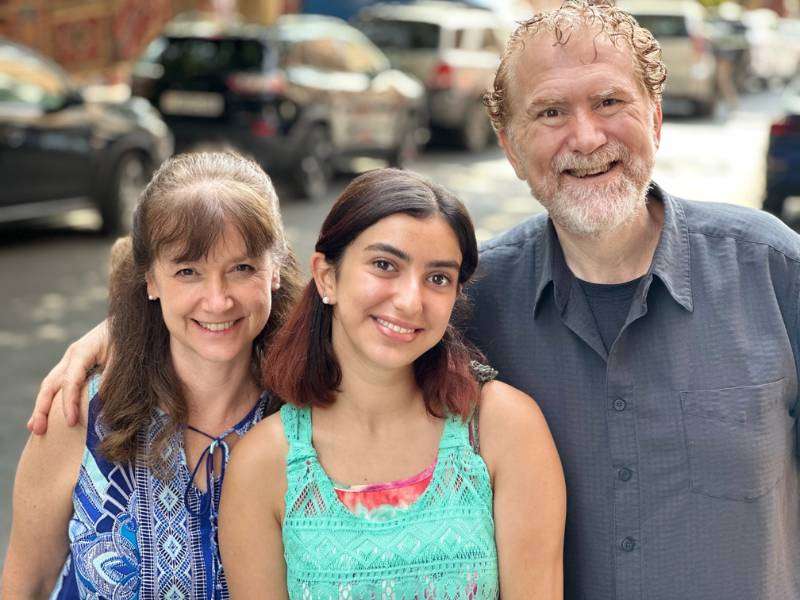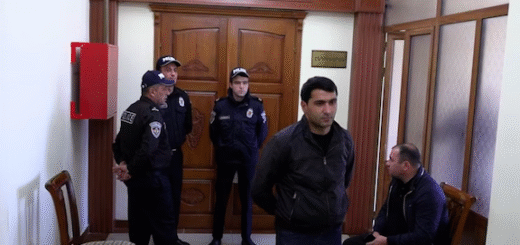Gifted Iranian Armenian Christian Caught in Visa Limbo

Armenia (International Christian Concern) — Reneta Dibaj is a gifted young violinist who leads worship at Yerevan International Church in Armenia. She has big dreams of studying in the United States and serving in ministry.
At 19, she’s poised, smart, and ambitious. She also has peace and trusts in the Lord for her future.
Like many Christians abroad, however, whose roots are in Iran or countries considered hostile to the United States administration, Dibaj’s plans are in limbo.
The teen musician, who is an Iranian citizen with long-term residency in Armenia, received a coveted full scholarship this fall to attend and study music at Liberty University in Lynchburg, Virginia. But she can’t get there.
Dibaj has not been able to secure a visa from the U.S. government. Liberty did everything to facilitate the onboarding process, yet the U.S. government failed to issue an F1 student visa. The U.S. Embassy in Armenia is currently unavailable for visa appointments for several months.
The situation is likely a consequence of the Trump Administration’s “travel ban” executive order passed earlier this summer. The order prevents citizens from several hostile nations, including Iran, from receiving immigrant and non-immigrant visas to the U.S.
The Trump administration issued the travel ban on June 5, affecting individuals from 12 countries, mainly in the Middle East and Africa. The ban restricts entry from Afghanistan, Burma, Chad, the Republic of the Congo, Equatorial Guinea, Eritrea, Haiti, Iran, Libya, Somalia, Sudan, and Yemen. Seven other nations were partially restricted.
The new travel ban is disrupting enrollment this fall for U.S. colleges and universities, with Iran having the highest number of students affected — more than 12,000 — according to reports from the American Council on Education and Open Doors. International Christian Concern (ICC) has also chronicled the journey of Artemis Ghasemzadeh, a 27-year-old Iranian woman, and other Christian asylum seekers who have been stranded in Panama.
Dibaj’s family is well known in Iranian and global Christian circles. Her grandfather was Mehdi Dibaj, a prominent Iranian Christian whose death and martyrdom triggered religious revivals across Iran. Sources later attributed his martyrdom to agents of Iran’s Ministry of Intelligence and Security (MOIS). The agents were also alleged to have murdered Bishop Haik Hovsepian Mehr, who raised global awareness about Mehdi Dibaj, and Pastor Tateos Michaelian that same year.
Reneta Dibaj’s father, Youseph, faces ongoing persecution in Iran. Authorities recently confiscated his phone, passport, and laptop. Dibaj and her mother, Marjan, have lived together in Armenia for the last six years. Her parents have since divorced.
As Dibaj recently met with an ICC staffer in Yerevan, she was reflective and confident that things would work out as the Lord intends. She sees two distinct paths and markers for her life, one spiritual and the other musical and academic.
“Since I was little, I was very close to God,” Dibaj said. “I remember I had a toy that was like a piano, and I used to lead my parents into worship and say, ‘You sing here. No, you don’t sing here. Now you all sing together.’ So, I always enjoyed worshiping. And this was also something that my mom prayed for when she was pregnant with me. She prayed that God would use me … and she used to get dreams and visions of me leading people into worship and leading people.”
Last year, she was invited to France and performed with the Paris Conservatory orchestra.
Dibaj has enjoyed living freely in Armenia for the past six years. It hasn’t been without challenges as she struggled early on to fit in. As the only foreigner in her school and music classrooms, she was bullied. Still, she can wear whatever she wants and worship openly and freely, which was impossible in Iran.
In Iran, which borders Armenia to the south, government authorities closed the Assembly of God church where her family worshipped. Christians were arrested and harassed. Her father was beaten, watched by authorities, and had his phone monitored. Agents most recently asked him about Dibaj’s plans and her faith.
Dibaj’s visa expires in October. She and her mother will be forced to return to Iran if they are not granted residency elsewhere. In Iran, they would surely face persecution. Iranian agents have visited Dibaj’s church in Armenia and are monitoring her activities and whereabouts.
Dibaj played the violin for seven years in Iran before her music teacher talked with her parents and told them Dibaj would have to go elsewhere to grow as a musician. Her parents decided that Dibaj and her mother would go to Armenia.
“In Armenia, I was able to go back to church and Yerevan International Church, which I now serve in,” Dibaj said. “I was there, and I started to get closer to God and was on the worship team.”
Dibaj has been blessed to flourish under the care and tutelage of Pastor Craig Simonian and his wife, Joyce. The couple has mentored dozens of young adults at Yerevan International Church, opening their home and serving them in Armenia and beyond. Dibaj, like many of the teens and young adults, refers to Pastor Simonian as her spiritual father. He baptized her in Lake Sevon.
The Simonians and Dibaj understand the challenges and dreams of many Iranians. Still, they see God’s hand on her and want her to be used by the Lord in mighty ways.
“We are aware that there are probably millions of Iranians who want to get to America,” Pastor Simonian said. “Yes, and I think there’s a humility for her to say, ‘Hey, I need this too.’ Like, why do I deserve this more than everyone else, and no one can answer that except this sense of God’s calling. It’s not a story about how I get to America and get my American passport. It’s basically a ticket to the future, because with an Iranian passport, you have literally a handful of countries you can get into on planet Earth. So that’s five countries that you could do ministry, as opposed to an American passport, which is 150 countries you can get into. So, it’s really about opening doors and what God wants to do.”
Simonian added that Liberty University excels at cultivating future Christian leaders, has one of the best music departments, and has a robust international student population.
ICC and other nonprofits and ministries are doing what they can to share Dibaj’s story, and those of other Christian refugees. For now, she continues to pray, knowing that the Lord can open doors he wants opened.
“Since I was little, I always used to watch movies based on true stories where missionaries go to countries that are in war and help the kids,” Dibaj said. “Everyone is feeding them, giving them clothes. Who is teaching them the Bible? Or how can they grow in their skills and have a future, not just give them survival things for that moment? When I started doing music, I was like, ‘I want to go to the countries that are in war and teach the kids music. And through music, I can share the gospel and teach Sunday school.’ Praise God.”





